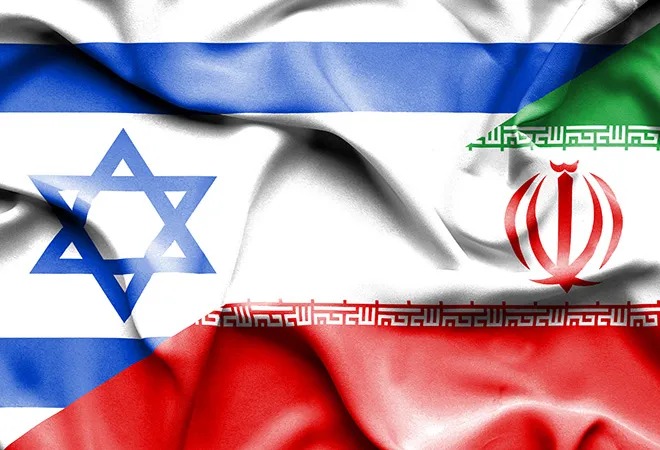
Published :
Updated :

Raging tensions between Iran and Israel along the global commercial lifeline pose significant threats to business stability, driving up oil prices, increasing shipping costs, and impacting overall production.
Business leaders and economists air such concerns in the wake of latest Israeli air strikes inside nuclear-armed Iran and tit-for-tat counteroffensive, in what is dubbed proxy wars in the oil-and-minerals-rich Middle East.
The ongoing conflicts may affect commodity prices, especially as key global shipping routes face heightened risks.
These observations were made in interviews with The Financial Express on Friday evening after a few Israeli airstrikes inside Iranian territory, targeting nuclear and military infrastructure.
This attack is the latest geopolitical shock to global economy that just recovered from US President Donald Trump's jacked-up tariffs.
Brent crude oil was up more than 5.0 per cent after earlier surging 13 per cent. The region accounts for a third of global crude production. Stocks fell around the world, with European equities dropping 1.1% and S%P 500 futures down 1.3%. The Israeli currency fell as much as 3.4% against the dollar, reports Bloomberg
The attack comes after an index of global stocks touched a record Thursday, gaining more than 20 per cent from a low hit in April. Investors are waiting to see whether the situation escalates.
In addition to local experts' concerns, global financial markets were shaken Friday, as escalating tensions between Iran and Israel sent oil prices soaring and triggered widespread selloffs in equities.
Following reports of Israeli strikes on Iranian nuclear facilities and military command centres, benchmark Brent crude rose by over 10 per cent in early trading, reaching its highest level since January, before slightly easing to an 8.0-petrcent gain by midday.
Experts note that the dramatic surge in oil prices has immediately fuelled concerns about inflationary pressures and potential disruptions to global supply chains.
JPMorgan has warned that in a worst-case scenario, such as a prolonged conflict or the closure of the Strait of Hormuz, Brent crude could skyrocket to $120-$130 per barrel.
Mahmud Hassan Khan Babu, managing director of Rising Group, says every war impacts the global economy. He notes that oil prices are immediately affected, which in turn causes a chain reaction, raising transportation costs. "We recently witnessed this with the Russia-Ukraine war," Babu told The Financial Express.
"It's still too early to predict the full economic impact on global trade, but we need at least a week to observe the situation in the Middle East," he added.
Babu, who is set to be elected next president of Bangladesh Garment Manufacturers and Exporters Association (BGMEA), stressed caution before making any definitive statement.
Dr Masrur Reaz, Chairman and CEO of Policy Exchange Bangladesh, thinks the Israeli strikes on Iran's nuclear facilities could have wide-ranging impacts on global trade. One key concern is the Strait of Hormuz, a narrow waterway that handles about a quarter of world's oil trade.
Located close to the conflict zone in Iran, the Strait is at significant risk of being disrupted. If the Strait is affected, the global oil supply will face major disruptions, driving prices higher. The crude-oil price has already surged within hours of the Israeli strike, reflecting these concerns.
Moreover, Iranian-aligned groups have the capability to control the Suez Canal, a vital shipping route that shortens travel between the Mediterranean and Red Seas for global trade, particularly for oil and other commodities. Last year, Yemen-based Houthi groups demonstrated their ability to disrupt the Red Sea. If such a scenario occurs again, it could increase shipping costs and lead times, Dr Reaz warns.
"We hope the global powers will take initiatives to contain this conflict," the economist says.
Global businesses are already grappling with several disruptions, including the Trump-era tariffs war, the Russia-Ukraine conflict, the Israel-Palestine war, and tensions between Thailand and Cambodia.
Echoing Dr Reaz's concerns, Kabir Ahmed, immediate-past president of the Bangladesh Freight Forwarders Association (BAFFA), says if the Red Sea route is disrupted, shipping companies will have to reroute their vessels around Africa, via the Cape of Good Hope. This detour could add 5,000 to 6,000 nautical miles to the journey, increasing shipping time by 14 to 15 days.
"This extended journey could raise shipping costs by an additional 30% to 40% per container," Ahmed notes.
Khandoker Rafiqul Islam, immediate-past president of BGMEA, warns that buyers are already pressuring manufacturers to reduce lead times. However, the ongoing conflict may further increase these lead times.
"If this conflict continues, it could reduce global demand for apparel, as western consumers may cut back on clothing purchases, affecting overall apparel demand," Islam predicts.
newsmanjasi@gmail.com


 For all latest news, follow The Financial Express Google News channel.
For all latest news, follow The Financial Express Google News channel.